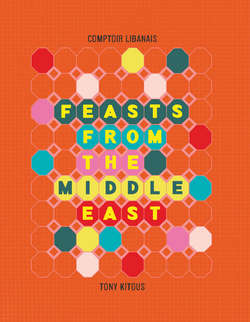Читать книгу Feasts From the Middle East - Tony Kitous - Страница 23
ОглавлениеYou’ll never see an Arabic table without bread on it. Bread means so much to people in the Middle East that if we don’t have any bread, we wonder how can we eat the food – there’s nothing to dip into the sauces or mop up any juices from a stew. Sometimes I have wondered whether the food that’s served is more important or the bread. That’s why I’m keen to share my pitta bread recipe so you, too, can always serve bread. This recipe has a particularly wholesome taste, thanks to the wholmeal flour, and is scattered with nigella seeds before baking for extra flavour.
ARABIC BREAD
KHOBZ
MAKES 12
1 tsp dried yeast
10g sugar
220ml lukewarm water
300g white bread flour
100g brown bread flour
5g salt
2 tsp olive oil
nigella seeds, to sprinkle
Put the yeast into a bowl with a good pinch of the sugar and half the water. Set aside for 5 minutes to allow the yeast to activate and become frothy.
Sieve the flours into a large bowl and stir in the salt. Make a well in the middle and pour in the oil, the yeast mixture and the remaining sugar and water. Stir everything together to make a rough dough. Knead on a board until smooth.
Put the dough into a clean bowl, cover and leave to rise for about 30 minutes until doubled in size.
Divide the dough into 12 pieces and roll them into rounds on a lightly floured surface. Sprinkle a few nigella seeds over the top of each piece before the final roll so they stick to the surface on the final roll. Put the pieces of rolled dough on to floured baking sheets and cover. Leave in a warm place for 45 minutes–1 hour to prove.
Preheat the oven to its hottest temperature.
Bake the pitta breads for 4–5 minutes until the dough has puffed up slightly and is cooked all the way through.
